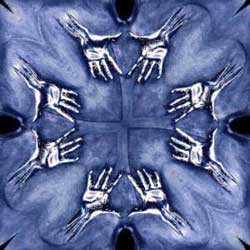 Headers flay foreign interference", "Polity capable of accommodating all", "Joint action urged to tide over economic woes". Newspaper headlines mirror the magnitude of the nation's political and economic turmoil. Commentators call on forces within the political system and outside to sort out their differences internally. There is growing apprehension that deepening domestic differences would give foreign hands wider legroom in Nepal.
Headers flay foreign interference", "Polity capable of accommodating all", "Joint action urged to tide over economic woes". Newspaper headlines mirror the magnitude of the nation's political and economic turmoil. Commentators call on forces within the political system and outside to sort out their differences internally. There is growing apprehension that deepening domestic differences would give foreign hands wider legroom in Nepal. Amid such a tense atmosphere in January 1990 a communist-socialist brigade arrived from New Delhi to address a political conference in the centre of Kathmandu. The moral support Indian political leaders from across the spectrum extended to Nepal's banned political parties infuriated the panchayat government, already reeling from New Delhi's virtual trade and transit embargo. Nepalis, fed up with decades of enforced silence and months of economic hardship, had no time for the patriotic pleas emanating from the official media.
In a matter of weeks, the 400,000 foot soldiers the partyless system bragged about disappeared without a trace. The term "people's representatives" suddenly carried a ring of authenticity. Even the most die-hard defenders of the panchayat system acknowledged that Nepalis were desperate for democratic change. What troubled many was the return on investment some foreign benefactors might demand.
Twelve years later, the greatest beneficiaries from the Chaksibari conclave are raising the loudest voices against external intervention. Those who consider foreign policy as war begun by other means concede that nations have to maintain an arsenal that includes everything between political words that injure and economic policies that cripple the adversary.
True, the Ranas were tricked into signing the 1950 peace and friendship treaty through false promises of political protection. But you can't blame India for completing a diplomatic assignment with such flourish. If Nepali politicians in the 1950s felt compelled to publicly express their gratitude to every official visitor from across the southern border, they were only reflecting the inherent character of the changes of 1951. The closed nature of the panchayat system granted its diplomats greater room for manoeuvre. The Kalapani controversy and the secret 1965 accord with India governing arms purchases punctured the myth of the panchas' unwavering patriotism an entire generation of Nepalis were raised on.
But a fairer debate would have to probe how the withdrawal of Indian military checkpoints bolstered the palace-driven offensive to assert Nepal's independent identity. It is easy to denigrate Nepali nationalism as a direct manifestation of anti-Indianism. But when you start detecting varying hues of a purported persecution complex in the other five nations of South Asia, there is a need for a more exhaustive evaluation. (I often wonder, though, how the nationalism debate would have been framed if we had an open border on the north and all of our rivers flowed in that direction.)
Critics of foreign interference today overlook how drastically the rules have changed since 1990. Many who rejoiced at Augusto Pinochet's detention in Britain on a Spanish warrant for the killing spree he presided over as president of Chile several years earlier missed the finer points of the internationalisation of sovereignty. After 11 September, 2001, poverty-induced resentment has been designated a vital threat to affluent societies. US President George W Bush's new approach to foreign aid has made a direct connection between poverty and terrorism. (Considering that last fall's attacks were led by multimillionaire Osama bin Laden and carried out by people of privilege, however, this premise might need further testing). The right to self-defence from shadowy non-state parties has redefined the approach to democracy, human rights and non-interference. How could one of the poorest countries of the world not have become a playground for external elements?
In modern times, foreign troops have entered a country either looking for those who invited them or have ended up as permanent guests. The peace that follows the thuds of foreign jackboots cannot be placid. But if external military support is what you need to regain normalcy, its probably not a bad idea to involve more than one country. The experience of Lebanon, which has more fault lines than Afghanistan, could prove instructive to Nepalis.
Our legislators complain that foreign military advisers are being allowed into places like Rolpa and Gorkha that are off limits to Nepalis. It's probably meaningless to argue that aliens wouldn't have descended on the Maoist front lines if our MPs had spent more time in their own constituencies. So we have to look at the bright side. As long as we retain our capacity to rail against foreign meddling, the outlook for the nation will remain good. In the meantime, we probably should try to ward off external hazards where we can. A new study has found that soiled Indian banknotes circulating in northern India could spread chronic tonsillitis, pneumonia and tuberculosis. Don't you think it's time our government required shopowners and cabdrivers to return the change in Nepali currency?


